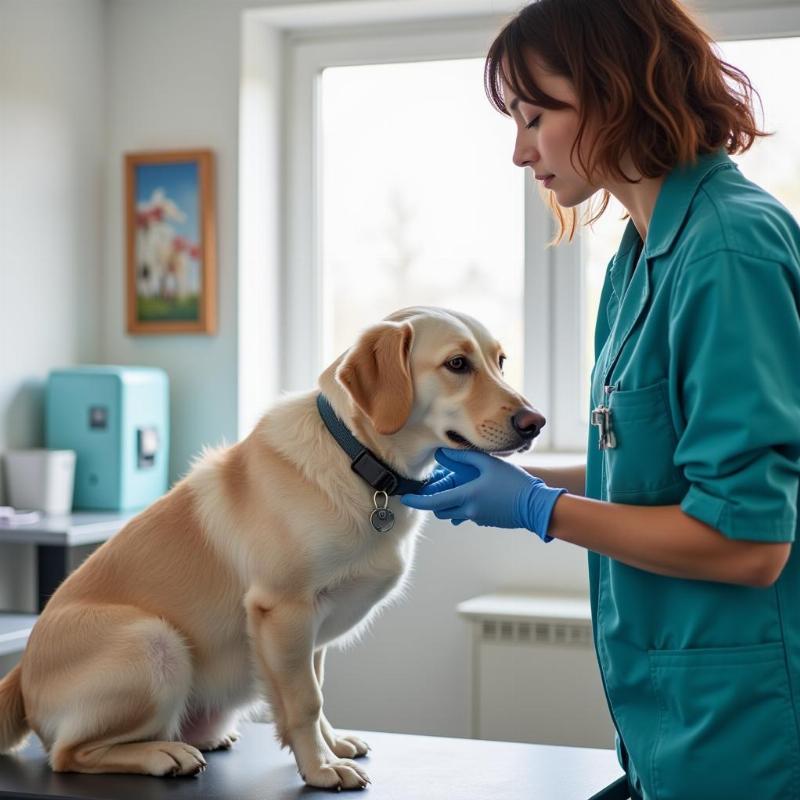Chill Protocol, often searched for as “chill protocol dosage for dogs pdf,” is a topic that raises many questions for dog owners. While a specific “Chill Protocol” for dogs doesn’t formally exist in veterinary medicine, the term often refers to methods for managing stress and anxiety in dogs, especially during stressful situations like vet visits, travel, or thunderstorms. This comprehensive guide will address the various interpretations of “Chill Protocol,” explore safe and effective ways to calm your anxious dog, and discuss when professional help is necessary. It is crucial to remember that administering any medication without veterinary guidance can be dangerous and harmful to your pet.
Decoding “Chill Protocol Dosage for Dogs PDF”
Many owners searching for “chill protocol dosage for dogs pdf” are likely seeking quick solutions to their dog’s anxiety. However, a downloadable PDF outlining specific dosages for a universal “Chill Protocol” isn’t readily available or recommended. Anxiety in dogs is complex and requires a tailored approach based on the individual dog’s breed, age, health status, and specific triggers. What works for one dog may not be suitable for another.
Safe and Effective Calming Methods for Dogs
Several safe and effective methods can help calm anxious dogs without resorting to medication. These include:
- Behavioral Modification: This involves identifying the triggers for your dog’s anxiety and gradually desensitizing them to these stimuli. This often requires professional guidance from a certified dog trainer or veterinary behaviorist.
- Environmental Enrichment: Creating a safe and predictable environment for your dog can significantly reduce anxiety. This includes providing a comfortable den-like space, predictable routines, and plenty of mental and physical stimulation.
- Natural Calming Aids: Several natural products, like pheromone diffusers, calming treats containing ingredients like L-theanine or chamomile, and pressure wraps, can help soothe anxious dogs. Consult your veterinarian before introducing any new supplements or products to your dog’s routine.
- Exercise and Mental Stimulation: Regular exercise and engaging mental activities, like puzzle toys and training sessions, can help reduce anxiety by burning off excess energy and providing a positive outlet for stress.
When to Consult a Veterinarian
While many calming techniques can be implemented at home, certain situations require professional veterinary intervention. If your dog’s anxiety is severe, impacting their quality of life, or accompanied by other behavioral changes, it’s crucial to consult your veterinarian. They can rule out any underlying medical conditions contributing to the anxiety and recommend appropriate management strategies, which may include medication.
Medications for Dog Anxiety: Veterinary Guidance is Key
If your veterinarian determines that medication is necessary, they will prescribe the most appropriate option for your dog’s specific situation. Common medications used for anxiety in dogs include:
- Anti-anxiety medications: These medications can help reduce anxiety in specific situations, such as during thunderstorms or vet visits.
- Antidepressants: In some cases, antidepressants may be prescribed for long-term management of anxiety disorders.
It is critical to remember that you should never administer medication to your dog without explicit instructions from a veterinarian. Providing incorrect dosages or using medications not intended for dogs can have serious health consequences.
 Veterinarian Examining a Dog
Veterinarian Examining a Dog
Conclusion
Addressing anxiety in dogs requires a multifaceted approach. While a quick-fix “chill protocol dosage for dogs pdf” may seem appealing, it’s crucial to prioritize your dog’s well-being by seeking professional veterinary guidance. By understanding the underlying causes of anxiety and implementing appropriate calming strategies, you can help your furry friend live a happier, more relaxed life. Remember to always consult your veterinarian before making any changes to your dog’s routine, especially concerning medication.
FAQ
- What is the Chill Protocol for dogs? There isn’t a formally recognized “Chill Protocol” in veterinary medicine. This term is often used colloquially to describe methods for calming anxious dogs.
- Can I find a “chill protocol dosage for dogs pdf”? While some resources may offer general advice, a specific dosage guide for a universal “Chill Protocol” is not recommended or readily available.
- What are safe ways to calm my anxious dog? Safe methods include behavioral modification, environmental enrichment, natural calming aids, and increased exercise and mental stimulation.
- When should I consult a veterinarian about my dog’s anxiety? Consult your vet if the anxiety is severe, impacting your dog’s quality of life, or accompanied by other behavioral changes.
- What medications are used for dog anxiety? Veterinarians may prescribe anti-anxiety medications or antidepressants depending on the individual dog’s needs. Never medicate your dog without veterinary guidance.
- Is it safe to use human anxiety medication on my dog? Absolutely not. Using human medication on your dog can be extremely dangerous and potentially fatal. Always consult with your veterinarian for safe and appropriate medication options.
- How can I find a qualified professional to help with my dog’s anxiety? Your veterinarian can refer you to a certified dog trainer or veterinary behaviorist.
About Beautdogs.us
Beautdogs.us is your premier online resource for comprehensive dog care information in the USA. We offer expert advice on dog breeds, nutrition, training, health, and overall well-being, catering to both new and experienced dog owners. From breed-specific guides to product recommendations, Beautdogs.us is your trusted companion on your dog ownership journey. For personalized support, contact us at [email protected] or call us at +1 501-555-7529.